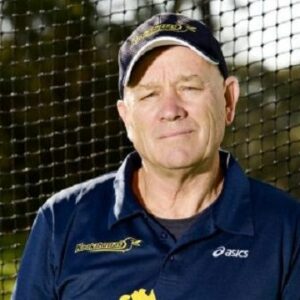Richard “Ric” Charlesworth is a sports consultant, a former hockey player, and Australia’s finest sporting coach. He excelled in whatever field he engaged in, whether it was leading the globe in hockey, captaining Western Australia in cricket, or obtaining a seat in federal politics. At an early stage of his sports career, he played domestic and county cricket before becoming the New Zealand Cricket Team’s high performance manager. He is also a football tactical genius, as seen by his mentoring responsibilities in the Australian Football League. His ten-year political career was highlighted by his work as an administrative member of the Western Australian Institute of Sport Board, which revealed his multi-talented personality. But it was clearly as an outstanding coach of Australian national hockey teams, both men and women, that he was most effective. Both teams won many international tournaments under his direction, including the Hockey World Cup and the Hockey Champions Trophy. He is the first person to have both played on and coached a World Cup-winning hockey team.
Childhood and Adolescence
He was born in Subiaco, Western Australia, on February 6, 1952, to dentist parents. Lester Charlesworth, his father, played cricket for Western Australia from 1949 to 1951. Christ Church Grammar School was where he acquired his early education, and he graduated in 1969. Ray House was his coach at the school, and he was promoted to the first XI at an early age.
In 1976, he graduated from the University of Western Australia with a Bachelor of Medicine/Bachelor of Surgery degree. Later, he concentrated in philosophy and history at the University of Western Australia, earning a Bachelor of Arts degree.
Career of Ric Charlesworth
He played 47 first-class cricket matches for the Western Australian team between 1972 and 1979. In 1972–73, 1976–77, and 1977–78, he was a member of Sheffield Shield winning teams. He was a member of the Australian hockey team from 1972 until 1988, appearing in 227 games. He was a member of five Olympic teams, including the 1980 and 1984 Olympics, where he captained the team. He also played for four different World Cup hockey teams. He was a member of the 1976 Olympic silver-medal-winning Australian hockey team and captained the 1986 World Cup-winning side.
In 1983, he entered politics and was elected to the Australian Labor Party’s Federal Member of Parliament for Perth, a position he maintained for ten years before resigning in 1993. From 1993 to 2000, he was the head coach of Australia’s women’s hockey team, the Hockeyroos. The squad won the Champion’s Trophy in 1993, 1995, 1997, and 1999, as well as the Hockey World Cup in 1994 and 1998, while he was coaching.
His first book, ‘The Coach – Managing for Success,’ was released in 2001. It proposed several intriguing coaching theories for achieving success in any sector. His second book, ‘Staying on Top,’ was published in 2002 and details the five rules that must be followed in order to be the best and stay there. ‘Shakespeare the Coach,’ his third book, was released in 2004, and it is more of a motivational manual for coaches, managers, teachers, and trainers.
In 1994, he was elected to the Australian Sports Commission Board, which he served on until 1997. During his administrative career, he also served on the Western Australian Institute of Sport Board twice: from 1984 to 1992 and again from 2001 to 2005. Following his time with the Hockeyroos, he went on to work for New Zealand Cricket as a high-performance manager, and then for Indian Hockey as a Technical Advisor.
In 2009, he was named Head Coach of the Kookaburras, an Australian men’s hockey team. Under his guidance, the squad won the Hockey World Cup twice and the Champion’s Trophy four times in a row. In 2014, he resigned from his position.
Achievements & Awards
During his career, he was named ‘Western Australian Sportsman of the Year’ three times: in 1976, 1979, and 1987.
The Australian Hockey team won the 1986 World Cup, and he was named Player of the Tournament for leading his team in scoring. He received the Advance Australia Award in 1984 and an Order of Australia medal in 1987 for his excellent efforts on the field.
He became the second person to be inducted into the Sport Australia Hall of Fame in 1987. The Hockeyroos won gold medals in the 1996 Atlanta Olympics, the 1998 Commonwealth Games, and the 2000 Sydney Olympics during his tenure as coach.
From 1994 to 2000, he received the West Australian Sports Champions of the Year Award for ‘Coach of the Year.’
In 1994, 1996, 1997, 1998, 1999, and 2000, he was named Team Coach of the Year by the Australian Coaching Council. He received the Confederation of Australian Sport Coach of the Year Award in 1996, 1997, and 2000.
In appreciation of his contributions in Australian sport, he was awarded the Australian Sports Medal in 2000.
He was named Western Australia Citizen of the Year in 2001. In 2010, he received the title of ‘Australian Institute of Sport Coach of the Year.’ In 2010 and 2014, the Kookaburras won the Men’s Hockey World Cup under his guidance. From 2009 to 2012, the squad won the Men’s Hockey Champions Trophy three times in a row, demonstrating his dominance as a coach.
Estimated Net Worth
Ric Charlesworth is one of the wealthiest cricket players and one of the most popular. Ric Charlesworth’s net worth is estimated to be $1.5 million, according to Wikipedia, Forbes, and Business Insider.


